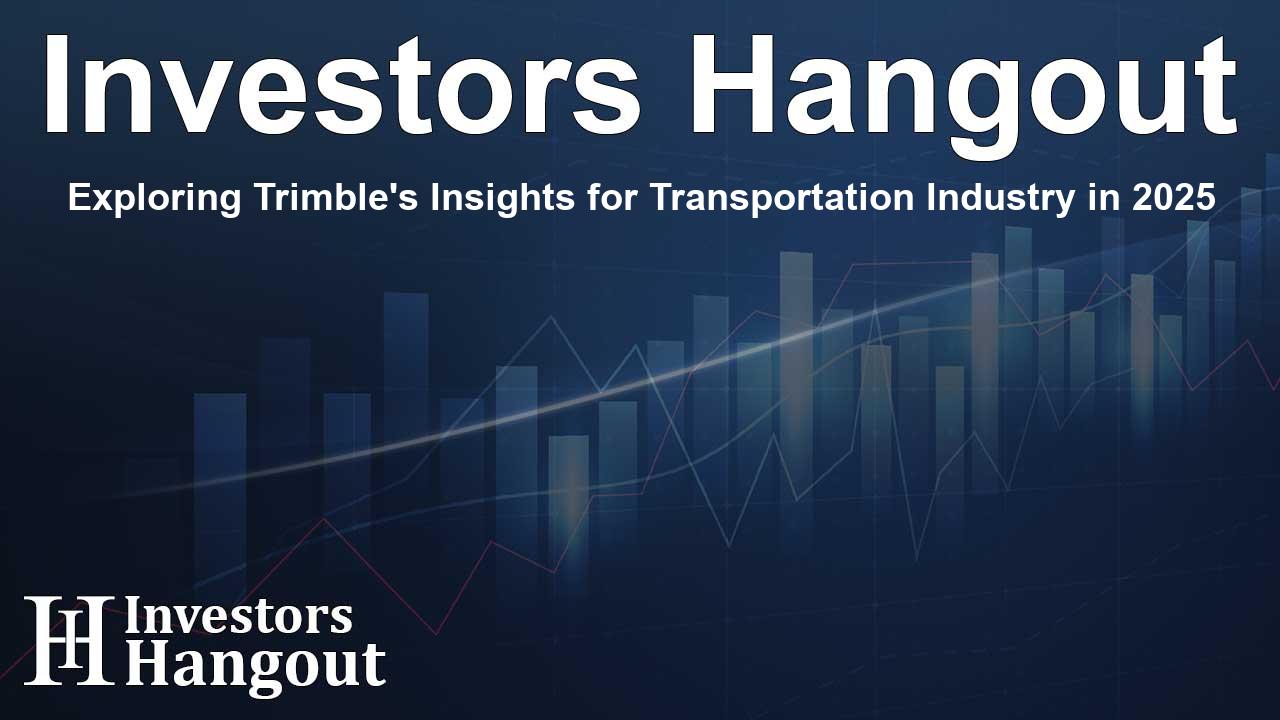Exploring Trimble's Insights for Transportation Industry in 2025

Trimble Reveals Key Findings for 2025 in Transportation Pulse Report
In today's rapidly changing transportation landscape, digitization, cost management, and market expansion have emerged as critical focus areas for the industry in North America and Europe.
Cautious Optimism for 2025
The recent Transportation Pulse Report from Trimble indicates that economic conditions (56%), geopolitical events (50%), and environmental regulations (36%) are among the most significant factors influencing the industry in the upcoming year. Amidst the challenges of global inflation, sluggish economic growth, and regional conflicts, uncertainty remains a constant theme.
Survey Insights from Shippers and Carriers
Interestingly, sentiments toward the future vary among different stakeholders. Survey respondents expressed a mix of optimism and caution:
- A substantial 75% of carriers and third-party logistics providers (3PLs) displayed optimism, likely driven by increasing freight demand and freight rates alongside a gradual reduction in capacity.
- Conversely, only 38% of shippers reported feeling optimistic, reflecting concern over projected rate increases and tighter market conditions.
Prioritizing Cost Control and Expansion
When questioned about their top priorities for 2025, both shippers and carriers emphasized the importance of maintaining profitability:
- Cost reduction topped the list, with 61% of respondents highlighting it as their main focus, while a notable 76% of shippers identified it as crucial.
- Market expansion ranked high among carriers and 3PLs, with 58% citing it as a key objective, indicating a readiness to capitalize on potential market recoveries.
- Supply chain digitization emerged as a priority for 51% of those surveyed, with European respondents showing more enthusiasm (59%) compared to their U.S. peers (39%).
- Sustainability initiatives also gained attention, securing 44% of the votes, underscoring their growing importance in the industry landscape.
The Automation Challenge
Despite marked interest, the implementation of technology remains a challenge. The study revealed that a significant 54% of respondents anticipated automating only a modest portion (25% or less) of their transportation processes by the end of 2025. Just 10% envisioned automating over 75% of their operations.
This gap presents a notable opportunity for the adoption of advanced technologies, including artificial intelligence (AI) and machine learning. While respondents identified AI as a crucial trend for shaping the industry, it appeared second on the priority list for carriers and 3PLs, further highlighting the potential for technological advancements to drive industry growth.
Philipp Pfister, chief customer experience officer at Transporeon, commented, "The survey reflects broader concerns about the global economy and geopolitics. Carriers and 3PLs recognize the opportunities for technological innovation, balancing their cautious optimism with a focus on using digital tools to control costs and enhance sustainability initiatives. Digitization may not solve every challenge, but the benefits are clear."
About Transporeon and Trimble
Transporeon, part of Trimble, is on a mission to synchronize transportation with global demands, operating the world's largest freight network. With over 1,400 shippers and 150,000 carriers, they facilitate more than 110,000 transports and 100,000 dock appointments daily, amounting to approximately €55 billion in freight processed annually.
Trimble is renowned for transforming methods of transportation and construction via their innovative technologies in positioning and data analytics, enhancing productivity and sustainability for customers across various sectors.
Frequently Asked Questions
What are the main findings of Trimble's Transportation Pulse Report?
The report highlights digitization, cost controls, and market expansion as top priorities for the transportation industry heading into 2025.
How optimistic are shippers and carriers for 2025?
While carriers and 3PLs exhibit a high level of optimism about market conditions, many shippers remain concerned due to anticipated rate increases and tighter capacity.
What are the biggest challenges facing the transportation industry?
Economic uncertainty, geopolitical events, and environmental regulations pose significant challenges to the transportation sector moving forward.
How important is technology in the future of transportation?
Technology, especially automation and digitization, is crucial for improving efficiency in the transportation industry, though implementation remains a challenge.
What role does sustainability play in the transportation sector?
Sustainability initiatives are increasingly recognized as essential, with 44% of survey respondents emphasizing their importance for the industry's future.
About Investors Hangout
Investors Hangout is a leading online stock forum for financial discussion and learning, offering a wide range of free tools and resources. It draws in traders of all levels, who exchange market knowledge, investigate trading tactics, and keep an eye on industry developments in real time. Featuring financial articles, stock message boards, quotes, charts, company profiles, and live news updates. Through cooperative learning and a wealth of informational resources, it helps users from novices creating their first portfolios to experts honing their techniques. Join Investors Hangout today: https://investorshangout.com/
Disclaimer: The content of this article is solely for general informational purposes only; it does not represent legal, financial, or investment advice. Investors Hangout does not offer financial advice; the author is not a licensed financial advisor. Consult a qualified advisor before making any financial or investment decisions based on this article. The author's interpretation of publicly available data shapes the opinions presented here; as a result, they should not be taken as advice to purchase, sell, or hold any securities mentioned or any other investments. The author does not guarantee the accuracy, completeness, or timeliness of any material, providing it "as is." Information and market conditions may change; past performance is not indicative of future outcomes. If any of the material offered here is inaccurate, please contact us for corrections.